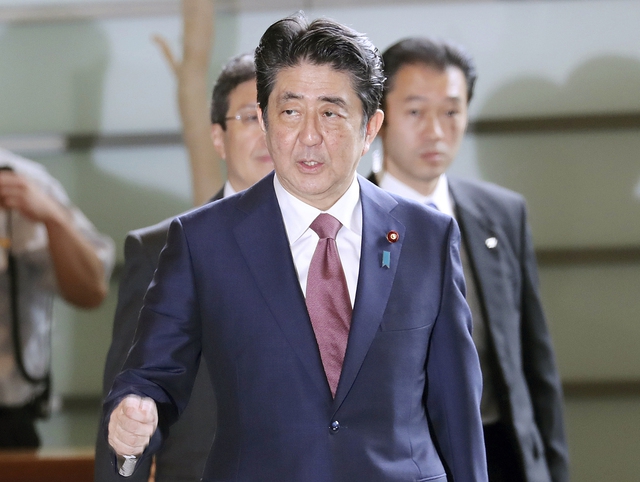 |
|
Japanese Prime Minister Shinzo Abe. (AP/Yonhap News)
|
Beijing welcomes the news, while Tokyo calls for continued pressure against North Korea
The Chinese government is watching developments closely after news of Seoul and Pyongyang’s agreement to hold an inter-Korean summit and North Korea’s statement of willingness to denuclearize. Beijing made the unusual move of releasing a late-night statement welcoming the news, while the Japanese government voiced wariness and called for “continued efforts to raise pressure on the North.” In a statement issued on the evening of Mar. 6 in the name of spokesperson Geng Shuang, the Chinese Foreign Ministry said that Beijing “welcome[s]” the positive outcomes of the recent presidential delegation visit. “As a close neighbor to the Korean Peninsula, China always supports the efforts made by the DPRK and ROK to improve their relations,” it continued. The statement went on to stress that the legitimate security concerns of relevant parties should be resolved through dialogue and negotiation, while calling on all parties to “seize the current opportunity.” “China is willing to continue to play its due role to this end,” it added. The Global Times argued on Mar. 7 that the lack of trust between North Korea and the US and the South Korean government’s shortage of capabilities meant the three parties lacked the ability to resolve issues on their own. “North and South must bring China, Russia, and the UN Security Council on board to continue the situation of relaxed tensions,” it said, emphasizing the importance of Beijing’s role. While visiting the US, Katsuyuki Kawai, special advisor for foreign affairs to the president of Japan’s Liberal Democratic Party (LDP), relayed Prime Minister Shinzo Abe’s response to reporters. “We will need to unite with other countries and observe the situation,” Abe was quoted by Kawai as saying on the evening of Mar. 6. In a Mar. 7 briefing, Chief Cabinet Secretary Yoshihide Suga said, “We need to base our response sufficiently in lessons from the past, when dialogue with North Korea did not lead to denuclearization.” “Dialogue for the sake of dialogue is meaningless. It is of crucial importance that North Korea show concrete actions toward denuclearization,” he continued. In a reiteration of Tokyo’s past position, Suga said, “We plan to continue cooperating bilaterally with the US and trilaterally with the US and South Korea and uniting with other relevant countries as we maximize pressure in various ways to change North Korea’s policies.” Meanwhile, concerns are being raised in Japan that the country may end up out in the cold if North Korea and the US engage in dialogue. The Yomiuri Shimbun newspaper quoted an anonymous Japanese Defense Ministry official as warning that “the issue of medium- and short-range ballistic missiles, where Japan falls in firing range, could get left out of the negotiations between the US and North Korea.” By Kim Oi-hyun, Beijing correspondent and Cho Ki-weon, Tokyo correspondent Please direct questions or comments to [english@hani.co.kr]





